Vallastaden is both a symbol and a prediction. A brand new, densely populated district within the city of Linköping in southern Sweden, Vallastaden is the focus of a vision in social, environmental and economic sustainability. It is an incarnation of the community of the future based on a new green way of living, consisting of over 1,000 residences that are built from environmentally-friendly construction materials.
Vallastaden’s unique residential building mix, encompassing a range of contrasting unit sizes and architectural styles, is gaining an international profile. It is becoming an emblem for a clean break with the past in its rejection of fossil fuels. The entire project has moved from vision to completion in only five years. The core of the philosophy behind the development is in prioritising the needs of the inhabitants. Embracing innovation is the means to fulfil this.
This new mode of urban planning, described as the Vallastaden Model, was celebrated throughout September 2017 by the Vallastaden housing and community Expo. The Expo’s mission, in part, was to convince visitors that the alternatives provided by the natural world can replace the reliance on old ‘dirty’ energy sources. Linköping’s new district is held up as an ideal to emulate; the hope is that its example will inspire and empower entire communities worldwide to significantly reduce their carbon footprint.
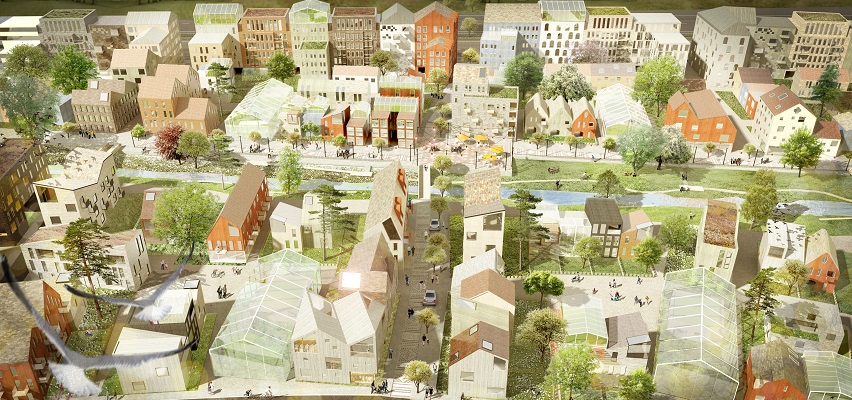
Vallastaden's living area is a community of the future based on a new green way of living.
More Efficient Waste Recycling Benefits the Whole Residential Community
Vallastaden's innovations confront the unsustainable way in which traditional cities are built and serviced. The twin drivers of increasing population and urban construction are increasing the pressures associated with waste. Investment in the disposal of household waste is one of the most explicit examples where Vallastaden is challenging the prevailing culture. The development aims to deliver efficient waste recycling that will produce viable alternative energy sources as significant by-products which benefit the lives of residents and the local environment.
MariMatic’s PAYT-Enabled Waste Collection Solution
MariMatic® Oy's contribution toward achieving Vallastaden's project aims is fundamental. Partnering with their client, Tekniska Verken in Linköping AB, MariMatic supplied and installed their MetroTaifun® Automatic Solid Waste Collection System (AWCS). MariMatic has been at the forefront of the development of vacuum waste conveying systems since 1983, having delivered more than 1,000 systems across various industries in over 40 countries. The installation of MariMatic's pneumatic conveying system commenced in the fourth quarter of 2013 - the first phase completing in the summer of 2017 - with work climaxing prior to the Vallastaden Expo.
This is a case of a technology whose time has come. Pneumatic solutions have long been acknowledged as a very efficient and sustainable way of transporting solid waste. The principles of the system were originally conceived in another era; when the environmental pressure for recycling waste was in its infancy. The method was viewed as an expensive alternative to traditional ways of handling household waste. Now the imperative for sustainability has considerable momentum.
Consequently, the philosophy has come out of the margins of waste management debates and caught up with the technology.
The expectations for MariMatic’s MetroTaifun AWCS at Vallastaden are high. As a unique project for the city of Linköping, the region and also for technical sciences; a suitably bold and imaginative solution for waste management was a key part of the initial brief for the project. MariMatic’s PAYT-enabled waste collection solution with scales in the inlets brings a number of benefits to Vallastaden: it allows for waste levels to be tracked and for detailed analytics to be recorded, enabling city authorities and waste service managers to maximise the efficiencies of their services. This information can reduce operational costs, and help to deal with the environmental issues associated with inefficient waste collection. Also, energy is saved because of the MetroTaifun piping functionalities; comprising small DN 300 pipe size and corrosion resistant composite material. Compared to traditional AWCS using DN 500 pipe size, MetroTaifun reduces overall energy consumption up to 75 per cent and installation of smaller and flexible pipes is easier.
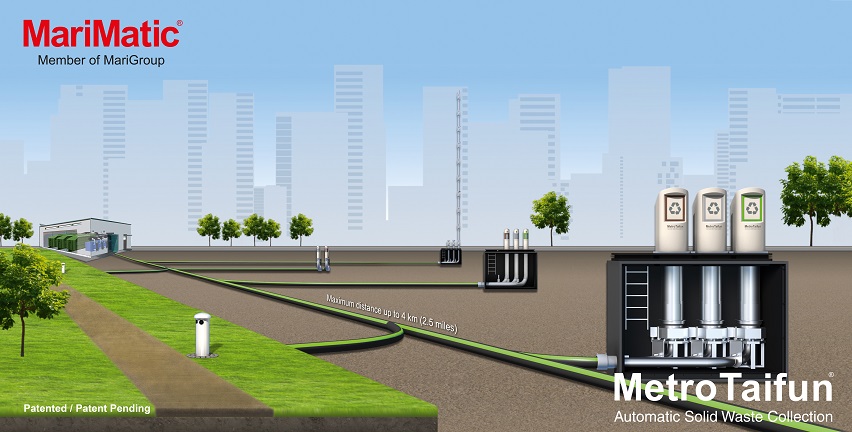
MetroTaifun is equipped with the new technology, which enables measuring the weight of waste.
Vallastaden's waste problems are no different to those in the rest of the city, or any typical, urban residential areas. However, the solution employed, as Liselott Myrbråten - the Business Area Manager in Linköping for Tekniska Verken explains, had to satisfy very specific demands: "We wanted the residents in Vallastaden to be offered the possibility to recycle in the same way as other local residents: what was critical here in this project is that it needed to be done without introducing heavy traffic to the area."
The Concept of Pay-As-You-Throw
The installation of MariMatic's MetroTaifun includes three distinctive features that are set to deliver benefits to this unique residential district for years to come. The first - the concept of Pay-As-You-Throw (PAYT) - is intrinsic to the
system. This creates the opportunity to exploit the current and future data possibilities which arise from integration of the waste system's functionalities with the Internet of Things (IoT). Completing this innovative trio, a 'world first' has been achieved due to the containment of the pneumatic waste collection pipe in Tekniska Verken's utility infrastructure Infra-tunnel (Infrakulvert). These features are a winning combination for Vallastaden: Liselott Myrbråten considers MariMatic's MetroTaifun AWCS: "The best-suited and most cost-effective solution in the public procurement process instigated for this exciting landmark in sustainability."
The MetroTaifun's energy efficiency is outstanding in comparison to other waste collection systems in terms of consumption and operating costs. Using less air volume means smaller equipment – a saving on valuable space that is superior by a third to competitor's specifications; explicit in lower investment costs. The composite piping material enables fast and economical installation, with 50 per cent less installation time than conventional alternatives.
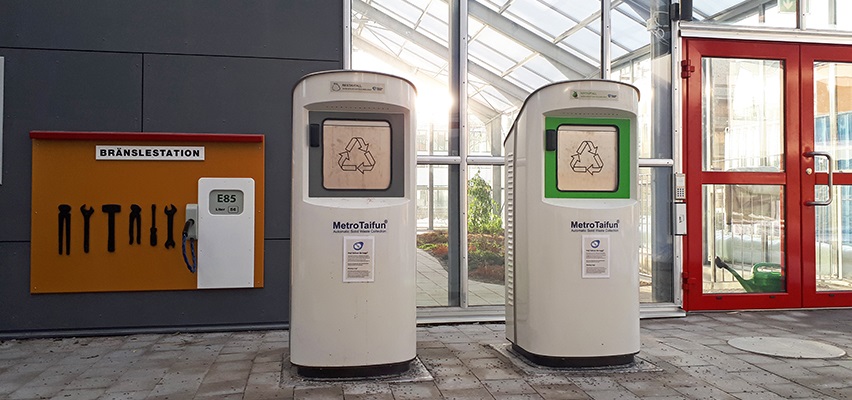
Waste collection inlets with scales in Vallastaden.
Pay-As-You-Throw Making Consumer Habits More Responsible
The MetroTaifun AWCS encourages a high degree of social, environmental and economic responsibility amongst Vallastaden's residents - in line with the overall vision of the development. MariMatic's TurnKey system (from development to manufacturing; installation to operational) is equipped with new technology; consisting of waste collecting inlets which employ scales to measure the weight of waste at the radio-frequency identification key (RFID) opening.
As Liselott Myrbråten stresses: "The system itself is very convenient and easy to use. Every bag is weighed and the weight is registered on the RFID key used to open the system inlet. Every flat or house has its own key, this means that residents only pay for what they discard with the Pay-as-you-throw system." The PAYT system reflects the polluter pays principle and has an educative function, clearly showing a household the scale of their waste habit. The direct cost correlation encourages a more responsible attitude, which has repercussions throughout the complete consumer cycle. Vallastaden residents will be made more aware of what resources are involved in the products that become their waste through the separation of the constituent parts. This may influence their buying choices in the future – when, for example, the quantity of packaging appears excessive - and may encourage them to recycle items rather than casually consign them to the waste system.
PAYT-Enabled Waste Collection Increases Sorting of Waste
This separation is described by Liselott Myrbråten: "Green bags with food waste are put into the bio waste inlet; the rest - also tied up in 20 litre bags - goes into the mixed waste inlet. It is all in the same pipe system, but the different inlets are emptied at different times." These bags containing different waste fractions are easily sorted and collected. Once deposited, they are "sucked away" using the MetroTaifun's strong vacuum air flow. The system transports them over
distance underground to two large containers in the waste transfer terminal, which is positioned to prevent any direct impact on Vallastaden's residents - for whom the system requires minimal effort. The process takes place out of sight: the waste is picked up from the waste transfer terminal and not from the residential area itself. The waste is treated at local waste treatment plants in Gärstad, Linköping. Waste of up to 1,100 residents - amounting to 460 tons per year - is dealt with by 15 waste collection stations; with 30 waste inlets feeding a pipeline of 1.5 kilometres in length.
Such convenience improves the quality of life. There is no need for residents to remember collection dates; no vehicles producing exhaust emissions - and it is also much safer without having to negotiate around heavy collection vehicles in
constricted city streets. The bio waste derives maximum environmental benefit; the bio gas produced is used as fuel for the city buses and the waste trucks in other parts of Linköping under the council's authority. Mixed waste will be
turned into heat, cooling and electricity.
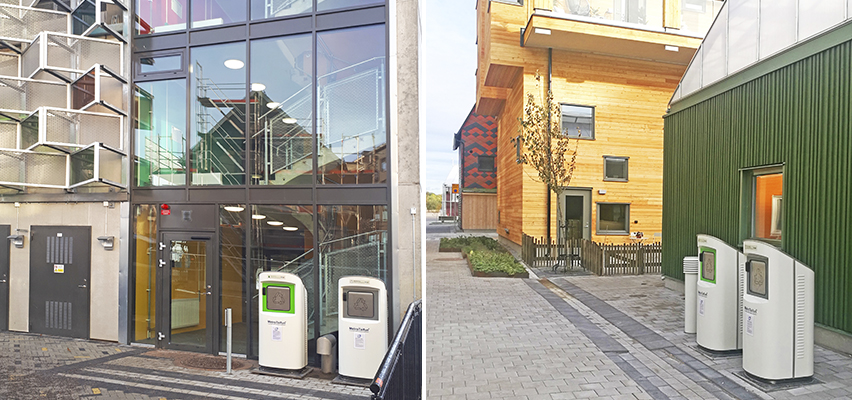
Waste collection inlets with scales in Vallastaden.
Connected Savings
Urban waste collection typically features predefined schedules that are undertaken on certain notified days, regardless of the volume of waste in the bins to be collected. The growth of IoT connected smart solutions will reduce this
inefficient use of assets and fuel. The technology involved in the MetroTaifun is flexible and provides the considerable economic, hygienic and social benefits of recycling.
Internet-enabled devices is an increasing trend in the waste industry and allows for flexible and smart waste collection. One example of this is the scale system implemented in MariMatic's MetroTaifun system in Linköping. Tekniska Verken will make use of the statistical waste data that the MetroTaifun AWCS collects. The data enables new invoicing methods based on PAYT, whereby long-term trends in waste collected from each building can be monitored; or the results can be used in targeted information campaigns that increase recycling.
The automation system controls and monitors the entire operation of MetroTaifun installations. The remote monitoring enables the system to run without intervention from maintenance staff and give alerts if something is wrong.
A World First
Tekniska Verken's Infra-Tunnel is a unique prefabricated construction, involving a combined site for all underground infrastructure. The Infra-Tunnel is a significant innovation; a smart alternative, and an investment in the future - creating new possibilities for the employment of an AWCS in urban areas around the world. Waste pipe with the green stripe Pneumatic waste systems are not normally built into these Infra-Tunnels. Here, it significantly reduces the costs for both operation and maintenance. Liselott Myrbråten contends that: "The combination of plastic tunnels and concrete chambers is quite unique for us as a project. The pneumatic waste system is not a new technology. What makes it a 'world first'
is how the system is built into the Infra-Tunnels, combined with the implementation of the PAYT system."
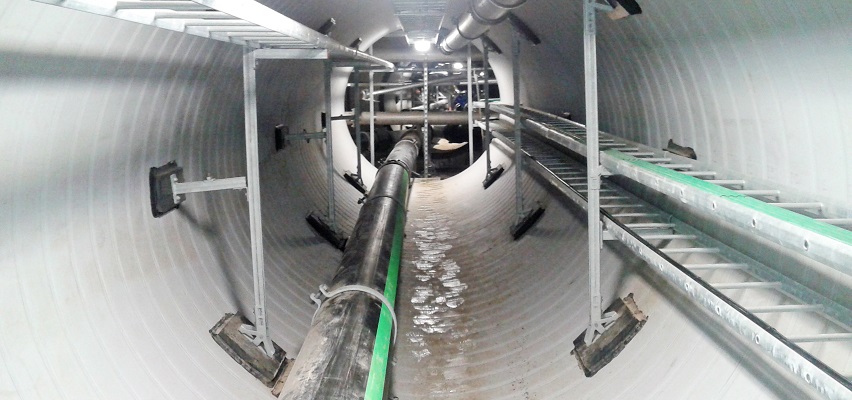
MetroTaifun waste pipe installed to the infra-tunnel.
The Infra-Tunnel has a predicted lifespan of at least 100 years. All service pipes including; electricity, fibre broadband, heating, sewage and water can be collected in a 2.5 metre diameter culvert. Considerably less space is taken and all services involve processes that are 100 per cent sustainable. The patented, prefabricated Infra-Tunnel makes more valuable land available above ground and the 1800 metres of culvert beneath Vallastaden's streets provides easy accessibility to all technical installations for maintenance, supervision and repairs; meaning little excavation in future.
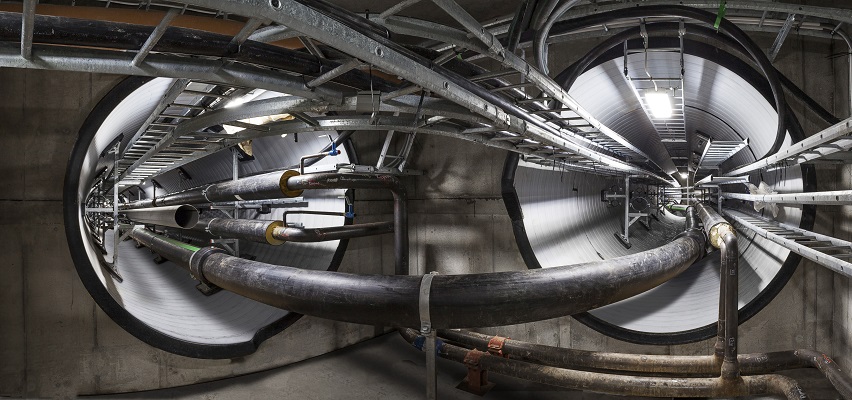
MetroTaifun composite waste pipe can be easily installed, because it bends to the space required. Picture: Uponor.
The Vallastaden district is a beacon which illuminates the significant benefits and improved quality of life that the defining vision of a sustainable future is set to provide for its residents. Yet it also shines equally brightly on the prospects for the installation of smart automated urban waste collection systems as an essential and integral part of that vision. A technology that is already delivering the future today.



